#Also she has excellent taste in treks she was like HELL YEAH SAME when I said my fave is DS9
Text
HOLY SHIT RABBI OF THE CONGREGATION I’M JOINING IS A TREKKIE!!!!
“Captain Janeway was one of my Roots” (iykyk)
Oh also they have adapted the Hora so like people on wheels can join or at least if they are at Simchat Torah they can get into the middle of the circle so that’s exciting.
#jewish#me#judaism#Also she has excellent taste in treks she was like HELL YEAH SAME when I said my fave is DS9#it’s also a fun bit of Jewish geography bc she went to rabbinical school and was good friends with my College Hillel’s Rabbinic Intern#who happens to be one of the most important people in my life#star trek#like how bashert is it if you can combine a Trek reference with “But I’m a Cheerleader!”#personal garbage
3 notes
·
View notes
Text
When I started TNG, the biggest curiosity I had was why Dr. Pulaski was so hated. I heard plenty about why, but at the same time I wanted to see for myself and be able to draw my own conclusions. Well now that I’ve finished S2, I think that I can safely state my opinion and the reasons why she had such a bad reception.
My general opinion is… Pulaski’s fine, but she got an bad start. She’s a very competent doctor who is devoted to her duty. She’s a bit of a smartass, but otherwise a friendly enough person. She’s a VERY much based off a certain CMO form a certain other Star Trek show that came out before this one, but we’ll get to that later. Pulaski honestly had a lot working against her and she just wasn’t able to get over them despite her actress Diana Muldaur (who played Miranda Jones in TOS) doing an excelent acting job. It ultimately ended with Pulaski being dropped all together and Crusher returning in Season 3.
While I understand the hate against Pulaski and can’t say that it’s unwarranted to an extent, I think that a lot of it that I saw was overblown. Now if people disliked the character, that’s fine. Everyone has different tastes and reasons for what they like and dislike and should be free to have and express those thoughts. But a lot of the issues with her that I had were taken care of very early on and she became much better by the end of her tenure. So why do I believe that Pulaski ultimately failed? Well I’ve come up with three explanations based off my own observations from watching the show and what I got from fandom consensus. Now this is all my opinion based on those observations and is not objective fact whatsoever, so take this with a grain of salt. So I believe the reasons that Pulaski failed are:
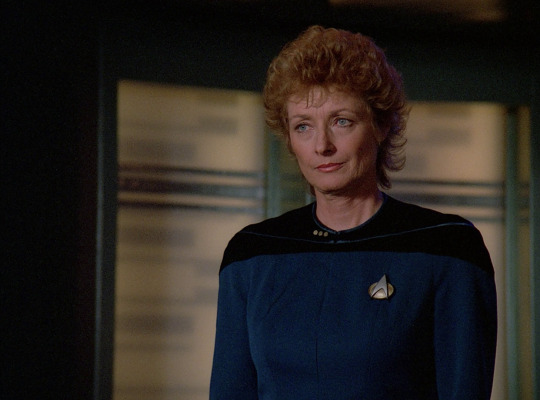
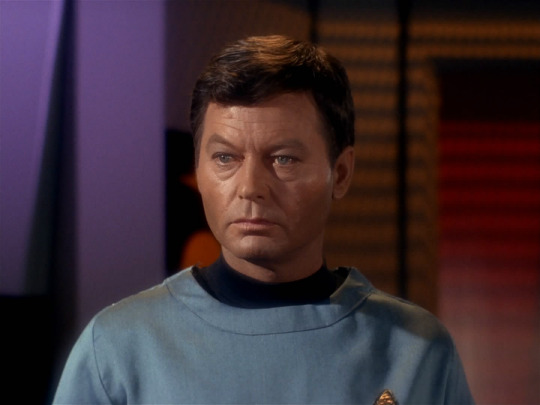
#1. She Is Essentially a Female Dr. McCoy… Sort Of: Pulaski was clearly heavily based on Dr. McCoy from TOS. She’s an middle-aged, somewhat world-weary doctor. She’s stubborn, grumpy, and doesn’t put up with anyone’s crap. She’s witty and always ready with a biting comment. She has the dedication to her job. She has the bantery relationship with the Science Officer, which we’ll go into that here soon. She is a doctor before she is an officer and that will always be her top priority, even at great risk to herself. She has a zero tolerance towards authority and isn’t afraid to talk back to anyone no matter how much they outrank her. She even outright has a hatred of teleporters that McCoy had. The parallels are all there. It may be why I’m a bit more lenient on her since McCoy is very much my favorite character in TOS and so far all of ST. But I think it is very much the root of the problem.
While Pulaski has several of McCoy’s traits, I think the writers really only understood McCoy on a surface level. They forget to include his compassion, his empathy, his humanism, his loyalty to the captain even when he opposes his actions, all of the things that make McCoy… well, McCoy. I don’t even know if the pacifism is there. Also McCoy had over 70 episodes of TOS and at that point five films (Undiscovered Country hadn’t been made yet). Pulaski had about 20 episodes and her relevance depended on the episode. McCoy had that as well, but he also had more material so we had FAR more time to get to know him. Pulaski didn’t get to have the time to gain that depth or care from the audience. Like… can I imagine Pulaski hypoing someone so that she can be tortured in their stead and it have the same impact that The Empath did? Can I see her counseling and assuring Picard if he’s having doubts like McCoy did for Kirk in The Ultimate Computer (okay tbf that would be Troi’s job but still)? Could I imagine any of the main cast being crushed about Pulaski dying of a terminal illness and choosing to stay on essentially a doomed spaceship with someone she just met and feel as gutted as I did in For the World is Hollow…? Honestly… given time maybe but in the end no. Now could I imagine McCoy risking getting an aging illness to possibly cure a child and others of it ala Unnatural Selection? Yes, albiet I think he’d be smart enough to bring protective equipment with him to be safe. Could I imagine McCoy telling someone like Data they’d be wrong to sit by a woman giving birth because he wasn’t human ala The Child? Hell no. Maybe he would if he was worried it would cause potential distress the one giving birth, but it sure as hell wouldn’t be because they’re an android. But I could imagine that someone who just saw McCoy as ‘grumpy doctor with a bad bedside manner who says witty lines and argues with the logical Vulcan character’ would get that interpretation. Thus why I think that Pulaski may have ended up how she did.
Now mind you I do think it IS a double standard to excuse McCoy’s dickish momemts and flaws, but demonize Pulaski for her’s. It’s like saying a man can be that way because it’s just expected of them and they can be forgiven, but a woman doing so or being assertice is wrong and they are horrible and unforgivable for having these traits or having flaws even if they correct them. That being said I do think that it’s more than that and it all comes down to the fact that TOS and TNG are two different shows with different character dynamics and ways of doing things. TOS mainly followed a Triumvirate (for the most part but that’s a different post entirely), TNG is much more of an ensemble. Pulaski didn’t have a Kirk nor a Spock to bounce off of or either let her traits shine or be kept in check like McCoy did nor did she really develop any unique relations for herself aside from maybe with Troi. We hear about her empathy and humanitarianism, but we don’t really see it on-screen like we did with McCoy. She has his surface level traits, not the deeper ones that the Triumvirate dynamic along his doctor position allowed him to showcase. In other words, Pulaski was put in a series that wasn’t designed for her while McCoy was exactly where he needed to be in order to thrive. It really speaks to how much the TNG writers didn’t really seem to get McCoy or why and how his character worked, which is strange since they got him right when he showed up in the series premiere. But maybe that was due to DeForest Kelley and him absolutely knowing the character he’d played for so long. But yeah they tried to replicate McCoy, and it just didn’t work with TNG’s already established character dynamics nor did they fully get the character that they were trying to recreate. If I want McCoy, I’ll go watch TOS or AOS. I didn’t need Pulaski for that.
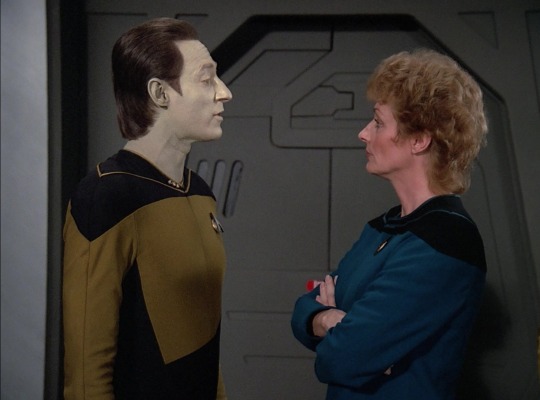
#2. Data and Misconstrued Character Dynamics; This is in relation to the first reason and REALLY shows how much the writers didn’t think the dynamics through. We all know how much Spock and McCoy bantered. How they are opposite ends of the spectrum and how their perspective points helped Kirk in making his decisions. Well clealry they wanted to re-create that with Pulaski and Data. Makes sense, Pulaski represents the humanism and Data the logical. But there’s one big, BIG problem with that: Data is NOT Spock. A lot fo people have pointed this out, but here’s the thing about Spock. Despite whatever he may have said, Spock DID have emotions. He kept them suppressed due to the issues in his upbringing and that wasn’t necessarily healthy, but he did have them. And despite speaking in a calm manner, he was also an utter sass bucket, could be rude, and had no issue putting down humanity if he had a point to make. He and McCoy were very much equal in their bantering and yes maybe McCoy could go too far with his insults, but there was always an equal balance and Spock was also perfectly capable of starting/escalating their spats. There were also plenty of moments to show that in spite of it, they were still friends and cared a great deal about each other with probably the best examples of this being The Immunity Syndrome, Bread and Circuses, The Empath, and plenty of moments in others like Miri and For the World is Hollow… Those who have been following me know how much I love the Spock/McCoy dynamic and I could go all day, but the point is it’s a complex relationship that may seem like disdain on the outside, but is so much more when you examine it up close.
Data however? Data is intelligent and the Science Officer with a calm demeanor, but that’s about where the similarity between him and Spock ends. Data is an android. I do not believe that he is emotionless, he just has a different wiring that causes him to feel things differently. He’s never shown disdain towards humanity at least from what I’ve observed thus far. If anything, he actively seeks to understand it and emotions more. He actively has hobbies like Sherlock Holmes. He tries things like sneezing and growing a beard in an effort to understand more. Data is more or less a child with a child-like understanding of things and he doesn’t really understand social cues or things like humor, but he DOES have emotions and feelings. There’s too much on-screen evidence to say otherwise. He just has his own way of processing it. This is what makes Pulaski look so bad. When she calls Data a machine, says he can’t understand, and even purposefully mispronounces his name, she comes across as an outright bully. She is essentially bullying a neurodivergent child. Do I need to explain why that’s awful? Data, while by no means a doormat, isn’t the type to sass back or make any biting comments back like Spock would. There is no balance. There is no equal footing. There are not enough positive interactions outside the banter to show that there is something deeper there at the end of the day like Spock and McCoy did. Heck you can even compare how Pulaski and McCoy talk to Data via McCoy’s guest appearance in Encounter at Farpoint. He DOES make a quip about Vulcans when talking to Data and when Data points out he’s an android not a Vulcan, McCoy mumbles “Just as bad.” But immediately after he gives Data genuine heartfelt advice on treating the Enterprise with care. It’s clear that ultimately it’s McCoy being his usual grumpy self who’d be acting the same way towards anyone else and is otherwise perfectly civil and encouraging to Data. We’ve known him long enough to know this. Pulaski didn’t have that luxury, coming off as condescending towards Data at best and considering that she’s a doctor, it looks especially bad.
Now to be fair this only lasts for about four episodes. Pulaski does start catching herself by her second episode, and stops completely after Unnatural Selection when Data helps her and stays with her after she gets the aging virus. After that she’s MUCH moe civil to him, even defending his choice going against the Prime Directive in Pen Pals and was at his retirement party in The Measure of a Man. But clearly the damage had been done. Data is a very beloved character and by Oulaski’s intro had already been established and well-liked character. Data was treated equally and was valued as far more than just an android among the rest of the crew, Crusher included, so Pulaski coming in a season later and acting that way also didn’t help. The writers did not think through why Spock and McCoy worked and how to try figure out a unique dynamic for Pulaski and Data. Instead they just tried to copy TOS, and it utterly failed. It ruined Pulaski’s chances before she could even really start running. But I do believe that she could have rebounded and as I said, she DID get past it. She did relapse some at the end of the season in Peak Performance to the point I wanna say that maybe it chronologically happened earlier in the season, but even then she felt realized her screw up and apologized. It’s still an improvement from early on. But things just weren’t meant to be, which leads is to…
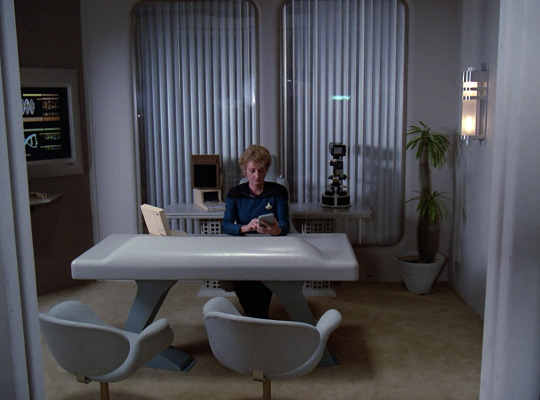
#3. She Only Lasted One Season/She Replaced Dr. Crusher: I believe that the biggest thing that worked against Pulaski is simple: she was cut after Season 2. Pulaski was created when Gates MacFadden left the show. I’ve seen conflicting reasons as to why, but regardless she left and a CMO was needed. IDK how popular Crusher was, but I had really enjoyed her. She was essentially the mom of the ship which added something different from TOS (wel McCoy was also the mom lets be real XD), had a son onboard which also added something new, was very much capable and devoted to her job, and was a badass when she got to use a phaser. Her being written out sucked, but that’s not necessarily a reason to hate Pulaski. But as I highlighted above, she just didn’t work. They tried to make McCoy, but without the dynamics and depth that let McCoy flourish. TNG is not TOS. Whenever TNG tried replicating TOS like with The Naked Now? It blew up in their faces. The key to a spinoff or reboot is to keep certain themes and tone alive, but to not just replicate what came before. TNG flourished when it began to find it’s own footing, and ultimately lasted four seasons longer than it’s predecessor due to it.
I genuinely believe that Pulaski COULD have developed into her own character and could have found her place the same way that McCoy did. But alas that didn’t happen. People wanted Crusher back, so they managed to get MacFadden to return and thus Crusher was put back in her rightful place. Because of it, Pulaski was just forgotten about. She didn’t get the chance to form her own character. She didn’t the chance to develop further and leave her early days behind. Why? Because she simply wasn’t given the opprotunity to do so. I can’t say it was the wrong choice, but it’s an utter shame because I do believe that Pulaski was on her way to improving. But it was too late. Her bad start with Data, her character not working in the TNG dynamic, and her replacing an already perfectly likeable character who did fit the dynamics all amounted to the character’s abrupt end. And because she didn’t get the chance to develop further and find her own path, her bad reputation has stuck to this very day.
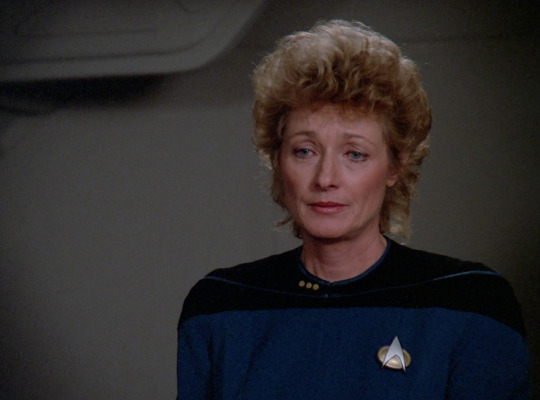
In the end, the whole thing just feels like a waste. Pulaski had potential, but it just didn’t work in the end. I can’t say that I hate her. If anything, I feel bad for her. The writers failed her at the end of the day and by the time they tried correcting their errors, the audience had already made their judgement. It may have been for the best to just drop her and bring Crusher back, but I also hate seeing character potential just so utterly wasted. I hope that if any side material used Pulaski, they were able to find a much better direction for her. I can’t say that I love Pulaski. In a more TOS-like setting maybe she’d have worked better. But in the end I think that Pulaski was a decent character who just had too much working against her and they caused her to crash and burn. Just an unfortunate case all in all.
(Image Source)
15 notes
·
View notes
Text
Star Trek: Voyager
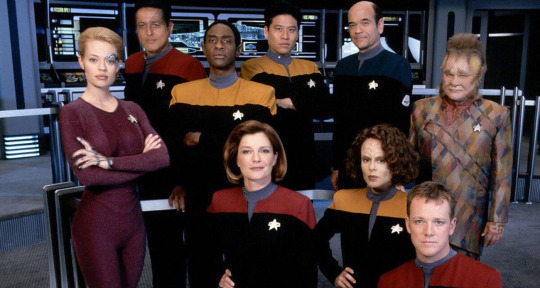
Yes this show ended some time ago; that doesn’t mean that it’s not still underrated.
A relative late convert to Star Trek, this author committed to traversing the Delta Quadrant having finished The Original Series, The Next Generation, Discovery & Picard to date. Deep Space Nine is next; like the Doctor I don’t know anything about this ‘Dominion’ but they seem important and we’ll get there.
Having now finished Voyager, here’s the (spoiler-filled) thoughts of someone who came to the bridge afresh and savoured the light-hearted nature of the show. Yes TNG demanded more attention and the episodes herein that do are generally better, but for relaxed, semi-serialised adventure Voyager is a high point.
We’ll start with the negative and get to the fun stuff.
From the get-go there was a jarring disconnect between the premise and goals of the show. If a ship more advanced than any in the region is travelling really fast in one direction they’re not going to keep running into the same people; better begetting a saga poised for episodic rather than serialised fiction. The writers and audience were evidently a little tired at this point of TNG’s slavish devotion to wrapping everything up in 40-odd minutes so wanted to try variations on a theme; it was the right approach for the time accompanied by a smart premise that didn’t match.
And a stellar premise it was only set to be buoyed by the Federation-Marquis dynamic. Also partly squandered, corresponding grounds for strong tension and stories were left by the wayside – characterised by Chakotay’s ill-established, apparently immediate and seemingly endless trust in Janeway; together major failings of the show.
On continuity, and just so it’s out of the way; no they don’t show it but it’s clear the crew just manufactured more photon torpedoes like they did so much else.
Commencing with one of the best episodes, there is rarely a subsequent moment as character-defining as Janeway destroying the array. Don’t get me wrong, Kate Mulgrew is great, but she alike Kirk and Picard are, as fleshed out as they become, for stretches bare variations on a tired theme; young headstrong hotshot dedicates their life to the stars to become a reasoned, seasoned Commander. ‘Tapestry’ did it best and there was no need to explore this further.
Voyager had a general problem with characters that took several seasons to grow; it was a long time before Neelix stopped being grating and his earnestness became endearing. There is too very little you can relay about Tuvak beyond his being a Vulcan and a little sardonic, or Harry besides his yearning for advancement or Chakotay aside his membership of the Marquis and focus on his cultural background.
The stand-out worst episode of the entire show was Chakotay finding out that the Sky Spirits central to his people’s religion were actually from the Delta Quadrant; you can garner Robert Beltran’s clear ambivalence (at best) to such material. This author is aware of the significant tension between the actor and others on set; I can understand the frustration at a lead cast member belittling the series in public but the directions and emphasis the character took in later seasons was something else, as were the music cues whenever his or some others’ cultures came up.
Star Trek, and notably The Original Series, is often (but not always) shrewd for both telling stories addressing the place of culture, religion and community in people’s lives while not overly if at all drawing attention to particular characters’ backgrounds. To Beltran’s credit, he only made the disaffection perceptible on screen in the episodes that were of poor taste, as opposed to the ones that were just bad. There are many lousy episodes of The Original Series but what near always makes it enjoyable is Shatner et al’s absolute commitment to the bit. One of the very worst episodes of Voyager is the one where Harry is lead to believe that he’s actually from a planet in the Delta Quadrant full of attractive women; yet no one in Star Trek ever needs to look bored reading their lines. There are good ones and bad ones and we’re along for the whole ride.
There’s also that one where Tom and the Captain turn into salamanders, start life on a random planet and somehow transform back into their usual selves with these shenanigans never brought up again. Yeah that was awful but it was preceded by a generally decent few acts centred on exceeding warp limits; reputation aside it wasn’t quite down there.
On Alpha Quadrant folks being in the Delta Quadrant, as much as I missed the Klingons they did not need to rock up latently and near the very end; there were plenty of better ways to give B’Elanna an arc. One of the more interesting characters, she offered a variation on Worf’s overwhelming pride as a Klingon, though she barely got enough episodes to shine and these were predominantly featured much later on. And when the show stopped pretending Tom was the cocky pilot we’ve seen dozens of times before he too managed to get a whole lot more interesting.
It would have made a lot more sense for McNeill to just directly continue his character from TNG’s ‘The First Duty;’ alas.
Also welcome were the insights into the Borg; even if they became a lot less eerie it was great to learn that much more about them, though nothing, save the introduction of Seven, bettered the recuperating drones who were the ship’s first Borg encounter. The Borg children were also very funny (the related Voyager pick-ups in Picard were excellent) and should have stayed on the ship longer so Seven could say more things like “fun will now commence;” she can only say “Naomi Wildman” deadpan, as good as it was, so many times.
Heralded by such a superb actress, Seven and the Doctor thrillingly shared dual arcs akin but distinct to Data’s and each other’s, permitting us to relish their gradual growth and revel in their leaps forward. Seven’s narrowing down of eligible crewmen, unlike Chakotay’s later courting, was a particular highlight, as was her month of isolation when the crew were in stasis and the one where the Doctor overtook her node.
The Doctor however emerges the best character, far and above all others save the near as interesting Seven. Picardo’s charisma and stage presence, well-befitting an exaggeratedly humanistic, bombastic piece of programming, only propelled the most relatable arcs in the series; his desire to fit in and, as any, make a contribution. The Doctor’s opening number in ‘Tinker, Tenor, Doctor, Spy,’ but one occasion where Picardo’s vocal abilities were graciously integrated into the series, by this author’s judgement is the funniest sequence in seven seasons.
‘Message in a Bottle’ with the Doctor centre was too among the very best of the series. Mining any opportunity for comedy we can nonetheless be grateful, alike TNG, that they kept the bald jokes to about one per season.
As asides, it was lovely to see Reginald Barclay return and realise his aspirations in one of the best and most heart-warming episodes of the saga, while the singular and very obvious inspiration one episode draws from Predator proved amusing for just being so unabashed.
‘Scorpion’ was amazing as was anything to do with Species 8472. Captain Proton, acknowledging the entire franchise’s schlocky roots, was a definite recurring highlight, with Mulgrew in one installment clearly having no end of fun alike the cast’s enjoyable turns in late 90’s Los Angeles alongside Sarah Silverman. Speaking of guest stars, seeing The Rock was a nice surprise though with hindsight they may never have cast him given Star Trek shrewdly chose to not have celebrity appearances overshadow the show. But hey, they can’t see the future; at least cleverly opting to obscure Jason Alexander in piles of costuming.
‘Year of Hell’ is good, but the premise befitted an entire season and alike the lacklustre finale nothing really matters (with some well-executed exceptions) if you can just go back in or erase time. There were many, many episodes that shouldn’t have been contained within forty minutes and deserved longer-form devotion, ala ‘30 Days.’ ‘Timeless’was a much better (and unusually technically-focused) variation on the aforementioned themes and it was fun to catch Geordi, as it was Deanna and especially Sulu. ‘The Omega Directive’ was cool; ‘The Thaw’ was great.
The fable-esque nature of the franchise has always been enjoyable and digestible given the show is partially aimed at kids, though there are episodes where it’s just a little too direct, and characters take a little too much pause. ‘Alice,’ the one where Tom almost cheats with his ship as an overly obvious parallel about why you shouldn’t have sex with other people if you have a girlfriend, if a good lesson, in execution was a tad much.
On reflection this author was surprised to discover some of the least generally favoured episodes, among them the Fairhaven double. It may be my great personal affection for Ireland but it makes perfect sense that given the time available this sort of world would be created and characters might pursue holo-relationships, a theme underexplored in Voyager yet still covered to great effect. The established technical deficiencies of holo-technology in such regular use should not come as a surprise when they recur.
The one where Kes comes back was actually a later highlight; her character was never very well handled and no it wasn’t that blast off into the sunset but sometimes old friends lose their way and it’s the job of old friends to set them on the right path.
Most surprising was the dislike directed at ‘Tuvix.’ The difference between Voyager and much heavier sci-fi is that herein characters make a lot of decisions that are hard, not ones that are difficult. The destruction of the array was devastating but not morally questionable within the confines of the show. As a tangent, you could argue that had Janeway made the decision to return to the Alpha Quadrant at the beginning of the series that it would have been the morally correct decision given that, as we see in ‘Hope and Fear,’ another highlight, the ship would not otherwise have been a factor in much disorder and destruction. The show was not however so expansive philosophically as to greatly tread such ground as the franchise otherwise managed in the likes of ‘City on the Edge of Forever.’
In ‘Tuvix’ Janeway, a figure, like Chakotay, who often shifted characterisation to fit the requirements of any given story, was faced with a difficult decision with no easy moral out nor ethically unquestionable approach. It was a refreshing change and correspondingly dark denouement to boot apparent in the likes of ‘Latent Image,’ another fine instalment with the Doctor.
‘Eye of the Needle,’ the only episode this author has watched twice to date and a deeply empathetic early high point, save ‘Balance of Terror’ is the best treatment of the guarded but necessarily relatable Romulans (I haven’t seen all the movies!). ‘The Void’ bookends the show as a later stand out while the in respects not dissimilar ‘Night’ bears one of the darkest challenges and finest, most resonant endings.
This brings us to the ‘best episode;’ one featured regularly in top ten lists but seemingly not a very favourite.
‘Blink of an Eye’ is everything that is exceptional and aspirational about Star Trek. Stranded in the stratosphere of a planet where time passes with greater rapidity, the curious presence of Voyager in the skies begins to influence the society to the point where the inhabitants develop space travel to face the spectre.
A commentary on the Prime Directive as deft as any and a relatively novel variation on both the time travel and petri dish tropes resplendent throughout sci-fi and Star Trek, the episode is also a fabulous meta-commentary on the place of the franchise in popular culture much less crude than Janeway bemoaning the Doctor’s fleeting interplanetary fans’ obsession with every aspect of his personal life. Incorporating a fair bit more science than is typically par, the astronaut’s moving decision to help them, as with his staring into the heavens as Voyager finally departs, speaks to the selfless ethos and sense of overwhelming curiosity so intrinsic to the most basic lore of Star Trek, the most beloved episodes and all that Gene Roddenberry best achieved.
It’s also an amazing meditation on first contact principles and pitfalls which unlike many episodes doesn’t borrow story bones from TNG.
A more than welcome reprieve from a pandemic, I didn’t spend as long in the Delta Quadrant as the crew but for what I did I was glad to relish with them.
Star Trek: Voyager is now streaming on Netflix
#xl#film/tv#voyager#star trek#star Trek: voyager#gene roddenberry#jeri ryan#kate mulgrew#roxann dawson#robert duncan mcneill#robert beltran#ethan phillips#tim russ#jennifer lien
24 notes
·
View notes
Text
a bunch of replies
anghraine replied to your post: replies
I’ve been lowkey pissed off at the whole IF YOU HAVE DISCOMFORT WITH HOW ÉOWYN’S ARC IS RESOLVED YOU JUST DON’T UNDERSTAND TOLKIEN’S THEMES ABOUT WAR thing for yeaaaars. yes yes peace > war but somehow Aragorn and Éomer can go a-conquering for decades and Faramir, who actively dislikes war, doesn’t give up /his/ sword. Hell, even Merry and Pippin don’t get marched through a renunciation narrative.
ALSO I am in complete agreement that a large part of the flaw there—and I do think it’s essentially a flaw of /craft/—is that 1) the swerve to healing is not set up at all (if anything, almost anti-set up by her clash with the warden) and 2) Éowyn is the only remotely prominent female character, and her resistance to gender roles has been persistently tied up in the warrior arc, so slicing that away would leave a bad taste even if it’d been handled better.
Yeah, tbh I think like....from a purely in-universe, individual perspective, the reason Eowyn gets that renunciation narrative and the others don’t should be because her personal issues and approach to war are so different from theirs, that’s the reason it’s so different for her-as-a-real-person. But as a character in a story with conservation-of-detail it’s just...when she also happens to be the only female warrior yeah, you can’t say it doesn’t send a message, or that the two roles don’t screw with each other. Like, there is definitely a gender thing there. If the gender thing was actually pointed out in-universe it would probably help a lot.
I...don’t necessarily agree that her gender-role-resistance thing being tied up in her warrior thing would leave a bad taste in the mouth no matter what, if Tolkien had dedicated sufficient pagetime to transmuting or migrating this gender-role-resistance of hers into a different and more meaningful channel, and/or more thoroughly undermining the impression that the men’s continued warfare is something they “get to” do instead of, like, a major kick in the teeth of the victory....but otoh then again, the fact that she’s the only woman around still sticks out no matter how well her arc is done internally so idk maybe yeah.
thelioninmybed replied to your post: gurguliare replied to your post: 🔥 eowyn? ...”
this is a v. v. good summary of what always annoyed me about what is an excellent character with one off the most important arcs in the books. It's the pulling double duty and yeah. god. more female characters, it's such a simple fix.
simaethae replied to your post: gurguliare replied to your post: 🔥...
“90% of all unfortunate implications regarding female characters. Would be totally solved if they didn’t usually make up <20% of the cast.” god yes so very much so!!!
IT’S SERIOUSLY SO EASY. Once you do that everything else starts to quickly fall into place because the female characters are no longer juggling utterly diametrically opposed jobs like being representations of their entire gender while also being a single realistic individual, yet somehow it’s the one thing writers and producers cannot seem to do!
simaethae replied to your post: 🔥Aule”
omg YES and also Sauron would find this SO ANNOYING
Hahahahaha omg yes. I was...sort of thinking about how the Valar don’t seem to really understand, or at least, don’t really understand how to deal with, like, internal evilness or darkness in a person, without seeing it as an external influence from Melkor. And I guess purely metaphysically speaking they’re sort of right-ish in that Melkor is the one who fucked everything up from the start, but psychologically speaking that’s not how it feels or works, even for eg, the Numenoreans. And for maiar who existed from the beginning before the world existed, even more so. Agreeing with an idea that someone else voiced first is very different from someone planting an idea in your mind by force, but I guess in story/song form these things might be harder for the Valar to differentiate, because of their perspective on how the-world-as-it-is came about?
crocordile replied to your post“🔥tell me your unpopular views on what elves look like and other visual...”
Oh my god, so much the last point!
All that stuff about ppl being “young, but not young” etc really got me wondering exactly what non-aging would actually look like and I sort of came up with Keanu Reeves
thelioninmybed replied to your post: gurguliare replied to your post: gurguliare...”
nah guys, it'd give him a radiant inner glow
shit I gotta do something even weirder now so people forget this
INCONCEIVABLE.
thelioninmybed replied to your post“gurguliare replied to your post: replies ...”
just casually get a horrendous facial tattoo of your gf/bf as of six moths' name, it'll come off eventually
This....this is somehow reminding of like, the El Aurians from Star Trek and their very non-tolkien-elf-like approach to longevity. Guinan: I was married 23 times and I loved all my husbands.
gurguliare replied to your post“ gurguliare replied to your post: gurguliare...”
but yes 2 healing things too of course, i mean i say the end of her arc isn't DISCRETE from the rest of it but it is especially clunky craft-wise. same for her and faramir falling in love tbh though i love MOST of that chapter's achieved effects, intentional and unintentional
YEAH it’s...not the best-written section of the books haha, and I guess everyone else’s arcs get squashed or glossed pretty similarly, but less is riding on their arcs than Eowyn’s
7 notes
·
View notes